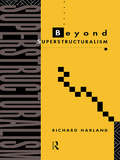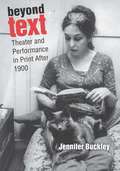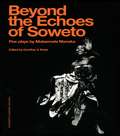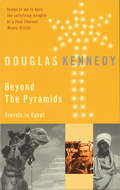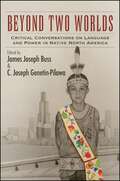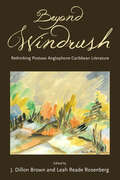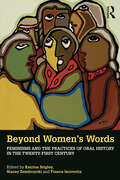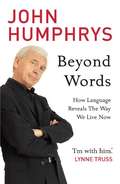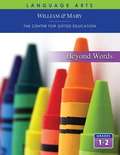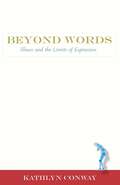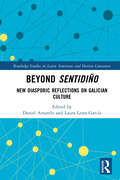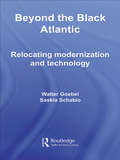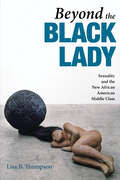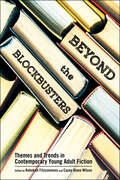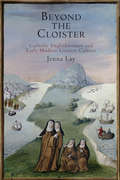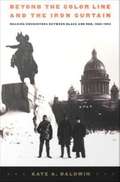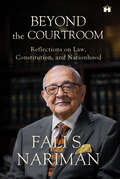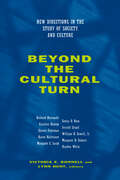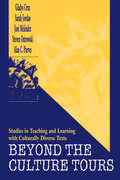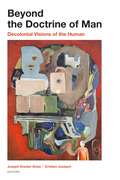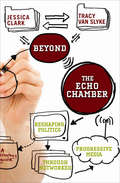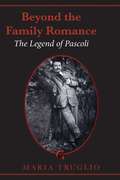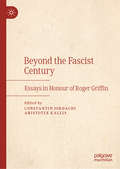- Table View
- List View
Beyond Superstructuralism
by Richard HarlandMoving on from his previous book, Superstructuralism , Richard Harland argues that the focus on single words in the structuralist theory of language is its key weakness and that the next advance beyond post-structuralism depends upon replacing word-based with syntagm-based theories. In a lucid way he develops a new syntagmatic theory which shows that the effect of combining words grammatically can transform the very nature of meaning. The wide breadth of coverage in the book covers both post-Chomskyan' linguistics and Derrida, and sets up an opposition to analytic and speech-act views of language. By presenting a systematic critique and counter-proposal, Harland challenges the very foundation of recent literary and language based theory.
Beyond Text: Theater and Performance in Print After 1900
by Jennifer BuckleyTaking up the work of prominent theater and performance artists, Beyond Text reveals the audacity and beauty of avant-garde performance in print. With extended analyses of the works of Edward Gordon Craig, German expressionist Lothar Schreyer, the Living Theatre, Carolee Schneemann, and Guillermo Gómez-Peña, the book shows how live performance and print aesthetically revived one another during a period in which both were supposed to be in a state of terminal cultural decline. While the European and American avant-gardes did indeed dismiss the dramatic author, they also adopted print as a theatrical medium, altering the status, form, and function of text and image in ways that continue to impact both the performing arts and the book arts. Beyond Text participates in the ongoing critical effort to unsettle conventional historical and theoretical accounts of text-performance relations, which have too often been figured in binary, chronological (“from page to stage”), or hierarchical terms. Across five case studies spanning twelve decades, Beyond Text demonstrates that print—as noun and verb—has been integral to the practices of modern and contemporary theater and performance artists.
Beyond The Echoesoweto
by Geoffrey V. Davis Matsemela ManakaFirst Published in 2004. Routledge is an imprint of Taylor & Francis, an informa company.
Beyond The Pyramids: Travels in Egypt
by Douglas KennedyBEYOND THE PYRAMIDS is a delightfully wry chronicle of travels through a country of incongruity - an Egypt encompassing a diversity of cultural influences which often belies its image of 'archaeological theme park'.With an acute eye for the unusual, the interesting or the plain absurd, Douglas Kennedy takes us on a continually surprising tour beyond the pyramids, to a place where Bedouin watch American television in an oasis; where monks in the desert are computer-literate; and where an entire community of Cairo's poor have set up home in a cemetary.'BEYOND THE PYRAMIDS seems to me to have the satisfying insights of a Paul Theroux' Maeve Binchy
Beyond The Pyramids: Travels in Egypt
by Douglas KennedyBEYOND THE PYRAMIDS is a delightfully wry chronicle of travels through a country of incongruity - an Egypt encompassing a diversity of cultural influences which often belies its image of 'archaeological theme park'.With an acute eye for the unusual, the interesting or the plain absurd, Douglas Kennedy takes us on a continually surprising tour beyond the pyramids, to a place where Bedouin watch American television in an oasis; where monks in the desert are computer-literate; and where an entire community of Cairo's poor have set up home in a cemetary.'BEYOND THE PYRAMIDS seems to me to have the satisfying insights of a Paul Theroux' Maeve Binchy
Beyond Two Worlds: Critical Conversations on Language and Power in Native North America (SUNY series, Tribal Worlds: Critical Studies in American Indian Nation Building)
by James Joseph Buss; C. Joseph Genetin-PilawaBeyond Two Worlds brings together scholars of Native history and Native American studies to offer fresh insights into the methodological and conceptual significance of the "two-worlds framework." They address the following questions: Where did the two-worlds framework originate? How has it changed over time? How does it continue to operate in today's world? Most people recognize the language of binaries birthed by the two-worlds trope—savage and civilized, East and West, primitive and modern. For more than four centuries, this lexicon has served as a grammar for settler colonialism. While many scholars have chastised this type of terminology in recent years, the power behind these words persists. With imagination and a critical evaluation of how language, politics, economics, and culture all influence the expectations that we place on one another, the contributors to this volume rethink the two-worlds trope, adding considerably to our understanding of the past and present.
Beyond Windrush: Rethinking Postwar Anglophone Caribbean Literature (Caribbean Studies Series)
by J. Dillon Brown Leah Reade RosenbergThis edited collection challenges a long sacrosanct paradigm. Since the establishment of Caribbean literary studies, scholars have exalted an elite cohort of émigré novelists based in postwar London, a group often referred to as “the Windrush writers” in tribute to the SS Empire Windrush, whose 1948 voyage from Jamaica inaugurated large-scale Caribbean migration to London. In critical accounts this group is typically reduced to the canonical troika of V. S. Naipaul, George Lamming, and Sam Selvon, effectively treating these three authors as the tradition's founding fathers. These “founders” have been properly celebrated for producing a complex, anticolonial, nationalist literature. However, their canonization has obscured the great diversity of postwar Caribbean writers, producing an enduring but narrow definition of West Indian literature. Beyond Windrush stands out as the first book to reexamine and redefine the writing of this crucial era. Its fourteen original essays make clear that in the 1950s there was already a wide spectrum of West Indian men and women—Afro-Caribbean, Indo-Caribbean, and white-creole—who were writing, publishing, and even painting. Many lived in the Caribbean and North America, rather than London. Moreover, these writers addressed subjects overlooked in the more conventionally conceived canon, including topics such as queer sexuality and the environment. This collection offers new readings of canonical authors (Lamming, Roger Mais, and Andrew Salkey); hitherto marginalized authors (Ismith Khan, Elma Napier, and John Hearne); and commonly ignored genres (memoir, short stories, and journalism).
Beyond Women's Words: Feminisms and the Practices of Oral History in the Twenty-First Century
by Franca Iacovetta Katrina Srigley Stacey ZembrzyckiBeyond Women’s Words unites feminist scholars, artists, and community activists working with the stories of women and other historically marginalized subjects to address the contributions and challenges of doing feminist oral history. Feminists who work with oral history methods want to tell stories that matter. They know, too, that the telling of those stories—the processes by which they are generated and recorded, and the different contexts in which they are shared and interpreted—also matters—a lot. Using Sherna Berger Gluck and Daphne Patai’s classic text, Women’s Words, as a platform to reflect on how feminisms, broadly defined, have influenced, and continue to influence, the wider field of oral history, this remarkable collection brings together an international, multi-generational, and multidisciplinary line-up of authors whose work highlights the great variety in understandings of, and approaches to, feminist oral histories. Through five thematic sections, the volume considers Indigenous modes of storytelling, feminism in diverse locales around the globe, different theoretical approaches, oral history as performance, digital oral history, and oral history as community-engagement. Beyond Women’s Words is ideal for students of oral history, anthropology, public history, women’s and gender history, and Women’s and Gender Studies, as well as activists, artists, and community-engaged practitioners.
Beyond Words
by John HumphrysFrom the huge response to Lost for Words, it?s clear that many of us share John?s strong feelings about the use and misuse of the English language. Not because we want to split hairs (or infinitives) but because how we use words reveals so much about the way we see the world.Here John takes a sharp look at phrases and expressions in current use to expose the often hidden attitudes that lie behind them ? from the schoolroom to the boardroom, from Westminster to the weather forecast. Questioning our assumptions, puncturing our illusions and illuminating the way we live now, Beyond Words is a small book that speaks volumes.
Beyond Words
by John Humphrys'Wonderfully spirited' DAILY MAILThe follow-up to the Sunday Times Top 10 bestseller Lost for Words, from Today presenter and national treasure John Humphrys.From the huge response to Lost for Words, it's clear that many of us share John's strong feelings about the use and misuse of the English language. Not because we want to split hairs (or infinitives) but because how we use words reveals so much about the way we see the world.Here John takes a sharp look at phrases and expressions in current use to expose the often hidden attitudes that lie behind them - from the schoolroom to the boardroom, from Westminster to the weather forecast. Questioning our assumptions, puncturing our illusions and illuminating the way we live now, Beyond Words is a small book that speaks volumes.
Beyond Words Student Guide Grades 1-2 (Second Edition)
by The Center for Gifted EducationThere are many poems in this book, as well as Activity Pages related to what you read and learn. During this unit, you will use several teaching models. They include: 1. The Literature Web Model 2. The Metaphor Analysis Model 3. The Vocabulary Web Model 4. The Hamburger Model for Persuasive Writing 5. The Writing Process Model
Beyond Words: Illness and the Limits of Expression (Literature and Medicine Series)
by Kathlyn Conway&“Kathlyn Conway opens primordial questions about the shattering events of illness through close readings of selected illness narratives, proposing that only writing of a daring kind can utter the knowledge of the self-telling body. Wielding her ferocious intellect and braving exposure to self and other, Conway makes original discoveries about writing and illness and, more stunningly, about writing and life. Not a book about illness, this is a book about writing and being. It is taut, brave, unequalled in our scholarship, and true. Conway joins our most powerful investigators of the human predicament of mortality, helping us to see, helping us to live.&”—Rita Charon, Columbia University, Program in Narrative MedicinePublished accounts of illness and disability often emphasize hope and positive thinking: the woman who still looked beautiful after losing her hair, the man who ran five miles a day during chemotherapy. This acclaimed examination of the genre of the illness narrative questions that upbeat approach. Author Kathlyn Conway, a three-time cancer survivor and herself the author of an illness memoir, believes that the triumphalist approach to writing about illness fails to do justice to the shattering experience of disease. By wrestling with the challenge of writing about the reality of serious illness and injury, she argues, writers can offer a truer picture of the complex relationship between body and mind.
Beyond sentidiño: New Diasporic Reflections on Galician Culture (Routledge Studies in Latin American and Iberian Literature)
by Amarelo, Edited by DanielBeyond Sentidiño: New Diasporic Reflections on Galician Culture is an interdisciplinary study of Galician literature, languages, and cultures. The volume brings together essays from fields across the humanities and social sciences to foster a discussion that incorporates new concepts that, as of now, are not part of the imaginary of Galiza: gentrification, language imperialism, youth unemployment, deruralization and deindustrialization, media control, technocapitalism, and gender and sexual normativity. It also serves to moderate a conversation about how independence from the political, material, and sociocultural networks of autonomic Galiza allows diasporic scholars to think of Galician culture in a de-essentializing manner. Working and living in the diaspora provides a lens through which to unmask the hegemonic neocolonial and neoliberal representation and reproduction of Galicianness promoted by different social, political, and mediatic powers.
Beyond the Black Atlantic: Relocating Modernization and Technology
by Walter Goebel Saskia SchabioDebates about the ‘Black Atlantic’ have alerted us to an experience of modernization that diverges from the dominant Western narratives of globalization and technological progress. This outstanding volume expands the concept of the Black Atlantic by reaching beyond the usual African-American focus of the field, presenting fresh perspectives on postcolonial experiences of technology and modernization. A team of renowned contributors come together in this volume in order to: redefine and expand ideas of Black Atlantic challenge unified concepts of modernization from a postcolonial perspective question fashionable concepts of the transnational by returning to the local and the national offer new approaches to cross-cultural mechanisms of exchange explore utopian uses of technology in the postcolonial sphere. Exploring a variety of national, diasporan and transnational counternarratives to Western modernization, Beyond the Black Atlantic makes a valuable contribution to the fields of postcolonial, literary and cultural studies.
Beyond the Black Lady: Sexuality and the New African American Middle Class (New Black Studies Series)
by Lisa B. ThompsonIn this book, Lisa B. Thompson explores the representation of black middle-class female sexuality by African American women authors in narrative literature, drama, film, and popular culture, showing how these depictions reclaim black female agency and illustrate the difficulties black women confront in asserting sexual agency in the public sphere. Thompson broadens the discourse around black female sexuality by offering an alternate reading of the overly determined racial and sexual script that casts the middle class "black lady" as the bastion of African American propriety. Drawing on the work of black feminist theorists, she examines symptomatic autobiographies, novels, plays, and key episodes in contemporary American popular culture, including works by Anita Hill, Judith Alexa Jackson, P. J. Gibson, Julie Dash, Kasi Lemmons, Jill Nelson, Lorene Cary, and Andrea Lee.
Beyond the Blockbusters: Themes and Trends in Contemporary Young Adult Fiction (Children's Literature Association Series)
by Rebekah Fitzsimmons and Casey Alane WilsonContributions by Megan Brown, Jill Coste, Sara K. Day, Rachel Dean-Ruzicka, Rebekah Fitzsimmons, Amber Gray, Roxanne Harde, Tom Jesse, Heidi Jones, Kaylee Jangula Mootz, Leah Phillips, Rachel L. Rickard Rebellino, S. R. Toliver, Jason Vanfosson, Sarah E. Whitney, and Casey Alane WilsonWhile critical and popular attention afforded to twenty-first-century young adult literature has exponentially increased in recent years, classroom materials and scholarship have remained static in focus and slight in scope. Twilight, The Hunger Games, The Fault in Our Stars, and The Hate U Give overwhelm conversations among scholars and critics—but these are far from the only texts in need of analysis.Beyond the Blockbusters: Themes and Trends in Contemporary Young Adult Fiction offers a necessary remedy to this limiting perspective, bringing together essays about the many subgenres, themes, and character types that have until now been overlooked. The collection tackles a diverse range of topics—modern updates to the marriage plot; fairy tale retellings in dystopian settings; stories of extrajudicial police killings and racial justice. The approaches are united, though, by a commitment to exploring the large-scale generic and theoretical structures at work in each set of texts. As a collection, Beyond the Blockbusters is an exciting entryway into a field that continues to grow and change even as its works captivate massive audiences. It will prove a crucial addition to the library of any scholar or instructor of young adult literature.
Beyond the Cloister: Catholic Englishwomen and Early Modern Literary Culture
by Jenna LayRepresentations of Catholic women appear with surprising frequency in the literature of post-Reformation England. Playwrights and poets from William Shakespeare to Andrew Marvell invoke the figure of the nun to powerful and often perplexing effect, and works that never directly address female Catholicism, such as Christopher Marlowe's Hero and Leander, share a discourse with contemporary debates regarding the status of recusant women. Catholic Englishwomen, whether living in convents on the European continent or as recusants in their own country, contributed to these debates, but even as their writings addressed the central religious and political issues of their time, their contributions were effaced and now are largely forgotten. Exploring the writings of Catholic women in conversation with those of Shakespeare, Marvell, Marlowe, Donne, and other canonical authors, Beyond the Cloister shows that nuns and recusants were centrally important to the development of English literature.The defining narratives of early modern England cast nuns as the relics of an unenlightened past and equated Catholic femininity with the dangerous charms of the Whore of Babylon. With careful attention to literary figurations of Catholic femininity and to the vibrant manuscript culture in the English convents, Jenna Lay reveals a far more complex reality. Through their use of tropes, figures, generic patterns, and literary allusions, Catholic women produced politically incendiary and rhetorically powerful lyrics, prayers, polemics, and hagiographies. Drawing on the insights of religious studies, historical formalism, and feminist criticism, Beyond the Cloister offers a reassessment of crucial decades in the development of English literary history.
Beyond the Color Line and the Iron Curtain: Reading Encounters Between Black and Red, 1922-1963
by Kate A. BaldwinExamining the significant influence of the Soviet Union on the work of four major African American authors--and on twentieth-century American debates about race--Beyond the Color Line and the Iron Curtain remaps black modernism, revealing the importance of the Soviet experience in the formation of a black transnationalism. Langston Hughes, W. E. B. Du Bois, Claude McKay, and Paul Robeson each lived or traveled extensively in the Soviet Union between the 1920s and the 1960s, and each reflected on Communism and Soviet life in works that have been largely unavailable, overlooked, or understudied. Kate A. Baldwin takes up these writings, as well as considerable material from Soviet sources--including articles in Pravda and Ogonek, political cartoons, Russian translations of unpublished manuscripts now lost, and mistranslations of major texts--to consider how these writers influenced and were influenced by both Soviet and American culture. Her work demonstrates how the construction of a new Soviet citizen attracted African Americans to the Soviet Union, where they could explore a national identity putatively free of class, gender, and racial biases. While Hughes and McKay later renounced their affiliations with the Soviet Union, Baldwin shows how, in different ways, both Hughes and McKay, as well as Du Bois and Robeson, used their encounters with the U. S. S. R. and Soviet models to rethink the exclusionary practices of citizenship and national belonging in the United States, and to move toward an internationalism that was a dynamic mix of antiracism, anticolonialism, social democracy, and international socialism. Recovering what Baldwin terms the "Soviet archive of Black America," this book forces a rereading of some of the most important African American writers and of the transnational circuits of black modernism.
Beyond the Courtroom
by Fali S. NarimanDiscover the profound contributions of Fali S. Nariman, a towering figure in Indian jurisprudence, through this authoritative anthology that encapsulates his lifelong dedication to law and justice. Beyond the Courtroom presents a meticulously curated selection of his most influential speeches, groundbreaking articles, and illuminating lectures, showcasing the vast breadth and depth of his legal and constitutional expertise.This collection spans the entirety of Nariman&’s distinguished career, offering incisive analyses of national issues, legal reforms, and critical reflections on arbitration, judiciary, and constitutional law. Each section highlights a unique facet of Nariman&’s intellectual rigour and legal acumen, providing readers with a comprehensive understanding of his perspectives on justice, governance, and the rule of law.With contributions that have shaped legal discourse and inspired countless professionals, this volume is an essential resource for legal scholars, practitioners, and anyone interested in the foundational principles of law, justice, and constitutional governance. Beyond the Courtroom stands as a testament to the enduring legacy of one of India&’s most esteemed legal minds.
Beyond the Cultural Turn: New Directions in the Study of Society and Culture (Studies on the History of Society and Culture #34)
by Margaret C. Jacob Richard Biernacki Jerrold Seigel Karen Halttunen Sonya O. Rose Hayden White William H. Sewell Margaret R. Somers Caroline Bynum Steven FeiermanNothing has generated more controversy in the social sciences than the turn toward culture, variously known as the linguistic turn, culturalism, or postmodernism. This book examines the impact of the cultural turn on two prominent social science disciplines, history and sociology, and proposes new directions in the theory and practice of historical research.The editors provide an introduction analyzing the origins and implications of the cultural turn and its postmodernist critiques of knowledge. Essays by leading historians and historical sociologists reflect on the uses of cultural theories and show both their promise and their limitations. The afterword by Hayden White provides an assessment of the trend toward culturalism by one its most influential proponents.Beyond the Cultural Turn offers fresh theoretical readings of the most persistent issues created by the cultural turn and provocative empirical studies focusing on diverse social practices, the uses of narrative, and the body and self as critical junctures where culture and society intersect.
Beyond the Culture Tours: Studies in Teaching and Learning With Culturally Diverse Texts
by Sarah Jordan Gladys Cruz Jos‚ Mel‚ndez Steven OstrowskiIn calling this book Beyond the Culture Tours, the authors bring the reader's attention to a set of issues in the teaching of literature and culture. The Culture Tour is an old concept in the West, dating back to the seventeenth century. The educated young man -- it was an exclusively male project at first -- was expected to round off his education with the Grand Tour. This meant a visit to the major sites on the European continent, particularly Greece and Rome, and occasionally to the Holy Land. The object was to have a first-hand view of these monuments, and looking at them alone brought people the name of being cultured or well-traveled. As the idea spread in the early part of the twentieth century, it allowed for the vicarious tour rather than the actual one. Students were asked to look at collections of art or reproductions of art work, listen to concerts or later recordings, and to read certain classical works drawn from what has come to be known as "the canon." The point of this form of education was that exposure to these works in itself formed a version of the Grand Tour. The basic idea behind the tour approach is that exposure to a culture in books is like travel to an ethnic theme park. This volume looks beyond the tour approach and reports on the results of a four-year project undertaken by a research team from the National Center for Research in the Learning and Teaching of Literature. Their intent was to study the teaching and impact of multicultural literature. The team examined how students approached texts that either came from their culture or from another, and how teachers perceived the students, the literature, and their role. This volume details various aspects of their findings.
Beyond the Doctrine of Man: Decolonial Visions of the Human
by Joseph Drexler-Dreis and Kristien JustaertCatalyzed by Sylvia Wynter’s questioning of modern/colonial descriptions of the human person, the essays in Beyond the Doctrine of Man interrogate the problem of these definitions of the human person and take up the struggle to decolonize and unsettle such descriptions.Contributors: Rufus Burnett Jr., M. Shawn Copeland, Yomaira C. Figueroa, Patrice Haynes, Xhercis Méndez, Andrew Prevot, Mayra Rivera, Linn Marie Tonstad, Alexander G. Weheliye
Beyond the Echo Chamber: Reshaping Politics Through Networked Progressive Media
by Jessica Clark Tracy Van SlykeStrategies and success stories: &“A must read for media practitioners, consumers, and progressives of all stripes.&” —Chris Hayes In the twenty-first century, a new breed of networked progressive media—from Brave New Films to Talking Points Memo to Feministing and beyond—have informed and engaged millions, influencing political campaigns, public debates, and policymaking at unprecedented levels. In Beyond the Echo Chamber, media experts Jessica Clark and Tracy Van Slyke tell the story of the rise of progressive media and lay out a clear, hard-hitting theory of ongoing impact. A vital strategic guide based on years of research and extensive interviews with key media players and new media experts, Beyond the Echo Chamber will change the national conversation about progressive media and the future of journalism itself. For progressive journalists, bloggers, producers, activists, citizens, and policymakers committed to change, here is a roadmap to victory.
Beyond the Family Romance: The Legend of Pascoli (The Royal Society of Canada Special Publications)
by Maria TruglioGiovanni Pascoli (1855–1912) is one of Italy’s most canonical and beloved poets. In Beyond the Family Romance, Maria Truglio offers fresh insight into the uncanny qualities of Pascoli’s domestic verse. As suggested by the Freudian title, this study opens a dialogue between Pascoli’s literature and Freud’s theories, with a particular focus on each author’s interrogation of origins. Through close readings and historical contextualization, themes of regression, memory, and other manifestations of ‘origins’ are analyzed, moving Pascoli’s poetry beyond the biographical strictures that have hitherto confined it.Truglio’s post-structuralist readings question the dichotomy between ‘safety within the home’ and the ‘threatening outside world,’ revealing the ambivalences with which images of the home are fraught in Pascoli’s poetry. In addition to the sustained comparison with Freud’s writing, Beyond the Family Romance explores parallels between Pascoli’s work and such writers as Tarchetti, Boito, Poe, and Invernizio. Rethinking the concept of the fanciullino (‘little child’), Truglio shows that Pascoli’s poetry enacts a symbiosis between the logic of the rational modern adult and the mythic vision of the child.
Beyond the Fascist Century: Essays in Honour of Roger Griffin
by Aristotle Kallis Constantin IordachiThis book evaluates the current and future state of fascism studies, reflecting on the first hundred years of fascism and looking ahead to a new era in which fascism studies increasingly faces fresh questions concerning its relevance and the potential reappearance of fascism. This wide-ranging work celebrates Roger Griffin’s contributions to fascism studies – in conceptual and definitional terms, but also in advancing our understanding of fascism – which have informed related research in a number of fields and directions since the 1990s. Bringing together three ‘generations’ of fascism scholars, the book offers a combination of broad conceptual essays and contributions focusing on particular themes and facets of fascism. The book features chapters, which, although diverse in their approaches, explore Griffin’s work while also engaging critically with other schools of thought. As such, it identifies new avenues of research in fascism studies, placing Griffin’s work within the context of new and emerging voices in the field.
